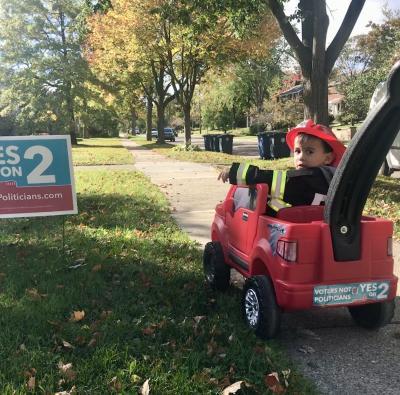Fed up with partisan gerrymandering in Michigan’s state legislative and congressional districts, Voters Not Politicians (VNP) proposed a ballot initiative in Michigan that would create an independent redistricting commission (IRC), passing it overwhelmingly in November 2018. After volunteers collected over 425,000 signatures from Michigan voters in every one of the state’s counties, submitted the initiative to be put on the general election ballot in November, and survived several legal challenges, Proposal 2 was put on the ballot in the midterm election. On November 6, 2018, 61% (over 2.5 million) of Michigan voters passed Proposal 2, amending the Michigan Constitution to establish an IRC. Michigan voters of both major political parties supported the amendment, including voters in 67 of Michigan’s 83 counties.
IRCs take the power of redistricting out of the hands of partisan legislators, who have proven that they will use the process to gain power when given the opportunity to do so. IRCs instead give the power to the citizens to choose their representatives and create a more fair and transparent process for redrawing districts. Michigan’s IRC as approved by the voters will first be in place in the 2020 redistricting cycle. The commission will consist of 13 registered voters, four of whom are Republicans, four of whom are Democrats, and five who self-identify as unaffiliated with either of the two major political parties. The process will allow for public input, public hearings, and public access to all the data, documents, and software used by the commission. The constitutional amendment also established redistricting criteria for the commissioners to follow to ensure fairer maps, including:
- complying with the federal Voting Rights Act
- not disproportionately favoring any political party or incumbent
- respecting communities of interest
- respecting county, city, and township lines
- geographic compactness
- contiguity
- equal population
Finally, the amendment established certain eligibility requirements for citizens applying for the role of a commissioner, in order to prevent conflicts of interest. These include prohibiting partisan officeholders and candidates, their paid employees, certain relatives, officers or leaders of a political party and lobbyists from serving as commissioners. Any citizen who cannot participate as a commissioner can still participate in the redistricting process, whether by participating at public hearings or submitting proposed maps.
On July 30, 2019, a group of 15 plaintiffs that identify as Republicans sued Michigan Secretary of State Jocelyn Benson, alleging that the commission’s eligibility requirements are unconstitutional under the First and Fourteenth Amendments of the U.S. Constitution. Plaintiffs also argue that the allegedly unconstitutional eligibility requirements are not severable from the rest of the amendment, meaning the whole amendment must be struck down. The plaintiffs requested a temporary delay to prevent Secretary Benson from implementing or preparing to select commissioners to serve on the commission.
On August 22, 2019, the Michigan Republican Party and several affiliated individuals also sued Michigan Secretary of State Jocelyn Benson, alleging that the commission’s eligibility requirements are unconstitutional under the First and Fourteenth Amendments of the U.S. Constitution. The plaintiffs requested an injunction and declaratory order to prevent Secretary Benson from implementing or preparing to select commissioners to serve on the commission.
CLC represents VNP as a Proposed Intervenor-Defendant in both cases. VNP moved to intervene in the lawsuit shortly after it was filed, in order to offer its expertise and insights as the drafter and sponsor of the constitutional amendment at issue and defend the constitutionality of the eligibility requirements for commissioners and the amendment.
On September 11, 2019, Michigan Republican Party v. Benson was consolidated with Daunt v. Benson. The consolidated cases will proceed under the name of the Lead Case, Daunt v. Benson.
